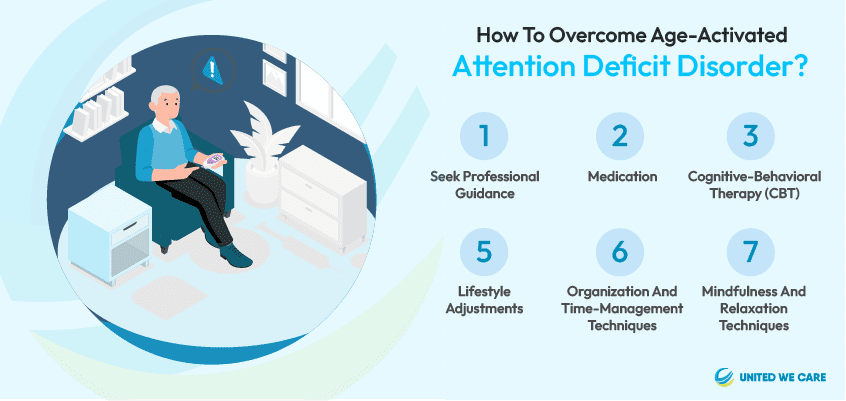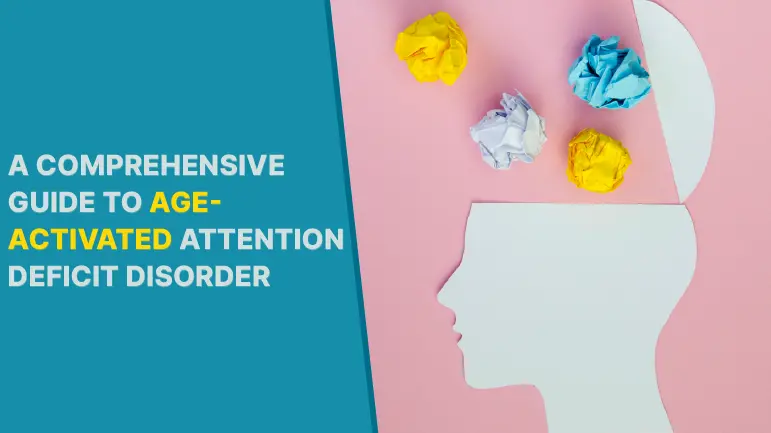Introduction
Age-activated attention deficit is a cognitive condition that affects people as they get older, usually after age 50. It makes it harder to pay attention and stay focused. People with this condition may have trouble remembering things and doing multiple tasks simultaneously. It can make daily activities more challenging. Understanding and addressing this condition is important to find ways to cope with the changes in attention and memory as we age.
What Is Age-Activated Attention Deficit Disorder?
Age-activated attention deficit disorder, or late-onset attention deficit disorder, is a cognitive condition that manifests in individuals as they grow older. It is characterized by a decline in attention and focus, making it challenging to concentrate and stay mentally engaged. People with Age activated attention deficit disorder may struggle with tasks that require sustained attention, memory recall, and multitasking[1].
Age-activated attention deficit disorder differs from other forms of attention deficit disorder, such as ADHD, as it occurs explicitly later in life. The exact causes of age-activated attention deficit disorder are not fully understood, but age-related changes in the brain’s structure and chemistry may contribute to its development.
The symptoms of age-activated attention deficit disorder can vary from person to person but commonly include difficulties in organizing and completing tasks, forgetfulness, and decreased cognitive processing speed. These challenges can impact daily activities, work performance, and overall quality of life[2].
Does Your ADHD Get Worse as You Age?
The impact of ADHD can vary as individuals age. While some people may find that their ADHD symptoms improve or become more manageable with time and experience, others may perceive a worsening of symptoms as they face new challenges and responsibilities.
As adults, individuals with ADHD may encounter increased demands in their personal and professional lives, exacerbating difficulties in staying organized, managing time, and maintaining focus. Furthermore, age-related factors like cognitive changes and hormonal shifts can interact with ADHD symptoms, potentially amplifying specific challenges.
For instance, cognitive decline associated with ageing may affect executive functions already impaired in ADHD. Additionally, hormonal changes, such as those occurring during menopause, can influence mood regulation and attention[3].
To navigate these changes, individuals with ADHD must seek ongoing support and adapt their coping strategies accordingly. Working closely with healthcare professionals, they can develop tailored approaches to manage their symptoms effectively and optimize their overall functioning as they age.
Do Age Activated ADHD Get Worse if Untreated?
If age-activated ADHD, also known as late-onset ADHD, is left untreated, it can negatively affect an individual’s functioning and quality of life. Without appropriate management and support, the symptoms associated with age-activated ADHD may persist or worsen over time.
Untreated age-activated ADHD can lead to ongoing difficulties in attention, impulse control, and organization, impacting various aspects of life, including work, relationships, and overall well-being. Challenges in maintaining focus and managing responsibilities can result in decreased productivity, increased stress, and impaired performance in tasks that require sustained attention[4].
Moreover, untreated age-activated ADHD can contribute to frustration, low self-esteem, and emotional distress as individuals struggle with ongoing symptoms without proper strategies or support.
The impact on mental health can be significant, leading to symptoms of anxiety, depression, and reduced overall quality of life.
Are You Living With Age-Activated ADHD?
Living with age-activated ADHD can be a unique experience, as it may present new challenges in daily life. Here are some strategies for navigating and thriving with age-activated ADHD:

- Self-awareness: Develop a deep understanding of your symptoms and how they affect you personally. Recognize your strengths and areas of difficulty, allowing you to adapt and find effective coping mechanisms.
- Structure and routines: Establish consistent practices and systems in your day-to-day life. Create schedules, prioritize tasks, and break them down into smaller, manageable steps. Using this tool can assist you in remaining organized and focused on your goals.
- Support systems: Seek support from loved ones, friends, or support groups who understand your challenges. Sharing experiences and receiving encouragement from others can be invaluable in managing ADHD.
- Time management techniques: Utilize tools such as timers, alarms, or digital calendars to help you stay focused and manage time effectively. Set reminders for important tasks and deadlines to avoid procrastination.
- Organization strategies: Implement organizational systems that work for you, whether using color-coded folders, labels, or digital apps to track documents and information.
- Self-care and stress management: Prioritize self-care activities, including regular exercise, healthy eating, sufficient sleep, and stress management techniques such as mindfulness or relaxation exercises.
Embrace your strengths, seek support when needed, and celebrate your accomplishments. With the right strategies and mindset, it is possible to live a fulfilling and successful life with age-activated ADHD.
Read more-ADHD Hyperfocus: Unleashing the true fact
How to Overcome Age-Activated Attention Deficit Disorder?
Overcoming age-activated attention deficit disorder involves a combination of strategies and interventions to manage symptoms and enhance overall cognitive functioning. Here are some approaches that can help[5]:

- Seek professional guidance: Consult with healthcare professionals, such as doctors or psychologists, specializing in cognitive disorders. They can diagnose accurately, offer personalized treatment plans, and guide you through managing Age-activated attention deficit disorder.
- Medication: Sometimes, healthcare professionals may recommend medications to help improve attention and focus. These medications can help regulate brain chemicals and alleviate symptoms of Age-Activated attention deficit disorder. Work closely with your healthcare provider to find the proper medication and dosage.
- Cognitive-behavioral therapy (CBT): Engaging in therapy can be beneficial in developing strategies to improve attention, organization, and memory. CBT can help you identify and modify negative thought patterns and implement practical techniques to enhance cognitive functioning.
- Lifestyle adjustments: Adopting healthy lifestyle habits can support cognitive health. Maintaining good health involves a combination of healthy eating habits, regular exercise, sufficient sleep, and effective stress management techniques. These lifestyle factors can positively impact attention and overall brain function.
- Organization and time-management techniques: Implementing organizational strategies, such as calendars, planners, and reminder systems, can help overcome challenges in staying organized and managing tasks. Break tasks into smaller, manageable steps to improve focus and productivity.
- Mindfulness and relaxation techniques: Practices like meditation, deep breathing exercises, and mindfulness can help improve focus, reduce stress, and enhance cognitive resilience.
Remember, overcoming Age-Activated attention deficit disorder is a process that may require patience and trial and error to find what works best for you. Working closely with healthcare professionals, implementing tailored strategies, and staying proactive in managing symptoms can significantly improve daily functioning and overall well-being.
Conclusion
Age-activated attention deficit can pose challenges in daily life, but with the right strategies and support, individuals can effectively manage its impact and maintain cognitive well-being. United We Care platform provides access to mental wellness resources, experts, and tools to support individuals in their journey toward better mental health and overall well-being.
References
[1]“ADHD in older adults,” WebMD. [Online]. Available: https://www.webmd.com/add-adhd/adhd-older-adults. [Accessed: 13-Jun-2023].
[2]Wikipedia contributors, “Adult attention deficit hyperactivity disorder,” Wikipedia, The Free Encyclopedia, 13-May-2023. [Online]. Available: https://en.wikipedia.org/w/index.php?title=Adult_attention_deficit_hyperactivity_disorder&oldid=1154628115.
[3]K. Cherney, “Does ADHD get worse with age? Your FAQs,” Healthline, 07-Jul-2022. [Online]. Available: https://www.healthline.com/health/adhd/can-adhd-get-worse-as-you-age. [Accessed: 13-Jun-2023].
[4]L. Martin, “Can ADHD get worse with age or does it improve?,” Medicalnewstoday.com, 11-May-2021. [Online]. Available: https://www.medicalnewstoday.com/articles/adhd-getting-worse-with-age. [Accessed: 13-Jun-2023].
[5]S. Collier, “Struggling with attention and organization as you age? It could be ADHD, not dementia,” Harvard Health, 21-Apr-2020. [Online]. Available: https://www.health.harvard.edu/blog/struggling-with-attention-and-organization-as-you-age-it-could-be-adhd-not-dementia-2020042119514. [Accessed: 13-Jun-2023].










